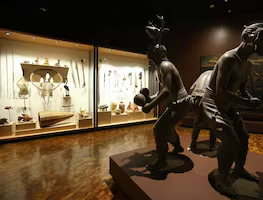Más Información

Claudia Sheinbaum reabre segundo piso del Museo de Antropología; rinde homenaje a culturas indígenas y afromexicanas

Identifican a mexicano muerto en tiroteo en Consulado de Honduras en EU; evitó la entrada de migrante armado

Frente frío 21 y tormenta invernal golpean México; alertan por caída de nieve, aguanieve y temperaturas bajo cero
Bringing awareness to the AIDS crisis when the disease was still a highly controversial and taboo topic is just one of the things General Idea is remembered for. Today, General Idea, a collective of three Canadian artists, Felix Parts, Jorge Zontal and AA Bronson, was inaugurated at the Museo Jumex in Mexico City, one of the collective's largest retrospectives ever and the first in Latin America.
The collection, which will also be shown at the Latin American Art Museum of Buenos Aires (MALBA), features 120 pieces that include video installations, photographs, paintings, articles and mass produced objects.
The exhibit, curated by Agustín Pérez Rubio, artistic director of the MALBA, touches on topics such as over 25 years of General Idea's discourse surrounding sexual diversity and the HIV crisis, which, in the 80s, few people dared to talk about publicly.
AA Bronson, the only surviving member of General Idea, was at the press conference for the collection's inauguration. In response to the pieces that the collective developed during the AIDS epidemic, AA Bronson said: “We wanted to put a face to the disease, which would force people to talk about it. People today still prefer not to even think about it, but it's one of the few diseases that has its own research organization at the UN. In the U.S. the groups that are seeing the most new cases of HIV infection are African-American and Latina women, not homosexuals. The virus is growing in communities that weren't affected by it before.”
The exhibit runs through February 12, 2017 at the Museo Jumex.








